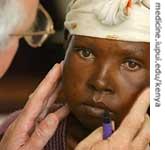VOA慢速英语 2007 0416a(在线收听)
This is the VOA Special English Development Report.
 |
| AMPATH patient in western Kenya |
The project began eighteen years ago. Today it treats more than forty thousand HIV-infected adults and children at nineteen centers in western Kenya.
Fran Quigley is the Indiana-based director of operations and development for AMPATH. He tells us that almost two thousand new patients are added to the program every month. And, he says, as long as AMPATH continues to receive enough antiretroviral drugs, the program will continue to grow.
The President’s Emergency Plan for AIDS Relief, started by the Bush administration, provides the drugs. Also, private individuals and organizations donate money to the program. Mister Quigley says AMPATH needs between twelve million and thirteen million dollars each year to operate.
Antiretrovirals are used to suppress HIV infections. New patients in the program are tested for the levels of virus in their blood. About half require immediate treatment. Patients whose own immune systems are still able to fight the virus can receive other services.
The way that the program deals with HIV/AIDS is holistic. In other words, it tries to deal with the complete needs of its patients. Most notably, many patients and their children get food assistance through the program. Mister Quigley says AMPATH doctors have learned that antiretroviral care cannot succeed if a patient is too weak from hunger.
AMPATH operates several farms. Patients can receive weekly or monthly food assistance. The United Nations World Food Program adds to these food supplies.
AMPATH also provides micro-loans and skills training to help patients become more economically secure. In addition, the program helps Kenyan children who have lost parents to AIDS. Often this assistance includes support for extended families that have taken in orphaned children.
Fran Quigley says the example of the Academic Model for Prevention and Treatment of HIV/AIDS can be copied throughout the developing world. For now though, he says the goal is to provide more and better services at its centers in Kenya.
Last December, a group of professors in the state of Indiana nominated AMPATH for this year’s Nobel Peace Prize. Whatever the result, Fran Quigley says that simply being nominated is a huge honor.
And that's the VOA Special English Development Report, written by Jill Moss. I’m Shep O'Neal.